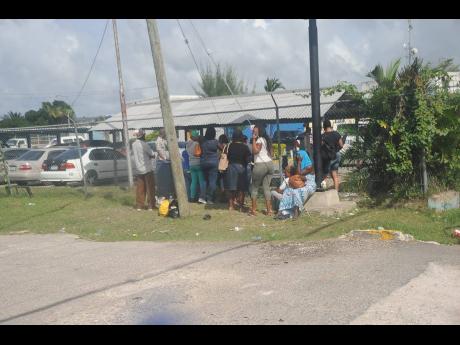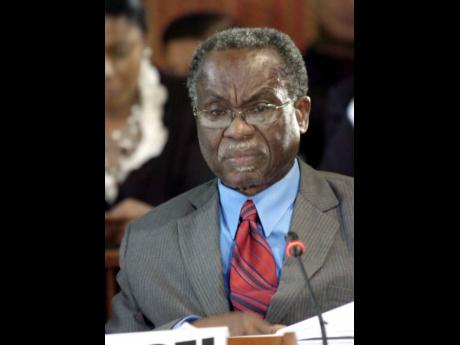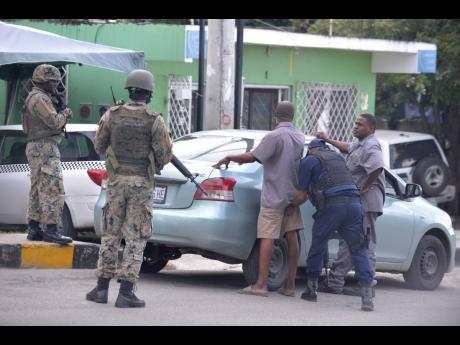‘I wanted to set a precedent’
SOE detainee in first court victory against State urges J’cans to fight for rights
One of the men who mounted the first legal challenge against the state of emergency (SOE) in 2020 said his motivation was to establish a precedent for the use of the enhanced security measure, particularly in inner-city communities. The St Andrew...
One of the men who mounted the first legal challenge against the state of emergency (SOE) in 2020 said his motivation was to establish a precedent for the use of the enhanced security measure, particularly in inner-city communities.
The St Andrew man spent nearly seven months in police custody without being charged for a criminal offence before a Supreme Court judge ruled last July, in the first of two seminal decisions, that his continued detention under the SOE was unconstitutional.
“My intention was solely to set a precedent within the confines of the law … to ensure that future generations would not be subjected to any tyrants that may arise 30, 40 or 50 years from now,” he told The Sunday Gleaner, taking a shot at lawmakers.
“It is my opinion that tyrants and governments are temporary. The law will outlive term limits that governments and tyrants enjoy.”
He requested that his name and the name of the prison where he was held not be included in this story.
On Friday, the second ruling in a case against the State about the constitutionality of the SOE was handed down in the Supreme Court. This time it was the case of St James taxi operator Roshaine Clarke, who was detained under the 2018 SOE at least four times for periods ranging from three days to seven months.
A panel of three judges declared that regulations 22, 30, 32, 33 and 38 (9) of the Emergency Powers Regulations breached sections of the Charter of Fundamental Rights and Freedoms.
The judges declared, too, that Clarke's detention was in breach of several constitutional rights and awarded him $17.8 million in damages, which includes $4 million for vindicatory damages.
The award for vindicatory damages took into consideration the failure by the police to inform Clarke of the reason for his detention and to place him before the court or an authorised officer as soon as was reasonably practicable, as well as the failure to release him for 26 days even though this was recommended by a review tribunal, the judgment said.
“It is to give an indication of the court's disapproval of the conduct of the perpetrator of the wrong. It's an indication of the court's condemnation of the action,” top constitutional attorney Dr Lloyd Barnett explained.
The multimillion-dollar award to Clarke opens the door to a tsunami of lawsuits against the State by persons who were detained under SOEs, legal experts warned.
“That's without a doubt,” said attorney John Clarke.
And Dr Barnett believes it would be “extremely difficult if not impossible” for the government to retroactively indemnify the actions of the police through legislation.
“The right to damages is given by the Constitution so that would mean an amendment of the Constitution,” he explained.
Human rights advocates estimate that over 11,000 people were detained for extended periods under the SOEs since 2018, which, at one point, was imposed across nine police divisions for several months.
But figures published by the Office of the Public Defender places the number of SOE detainees at over 4,000, though the agency acknowledged that not all police divisions provided data on the number of people in their custody.
MORE LAWSUITS
John Clarke, who is the attorney for the St Andrew man who was among five detainees released after the first court ruling, said his client has already been awarded damages for his detention. An assessment of the damages has been placed on hold pending the outcome of the Government's appeal against the ruling.
Clarke also represents 20 detainees who have already filed lawsuits against the State and said others have contacted him about taking a similar course.
Attorney-at-law Michael Hemmings told The Sunday Gleaner that 10 persons contacted him hours after Friday's ruling to enquire about pursuing lawsuits against the State.
“They should all come forward and they should all seek compensation, and moving forward, the Government must contemplate a system to deal with that because from their own records, more than 1,000 persons were detained under the state of emergency,” said John Clarke.
But the St Andrew man who spoke to The Sunday Gleaner insisted that his legal challenge was not motivated by the potential cash windfall that could come from his “unlawful” detention, before invoking the words of American philosopher Benjamin Franklin.
“Any society that will give up a little liberty to gain a little security will deserve neither and lose both,” he said.
He was also critical of “governments and those with the power to use a pen to detain and confine others in the name of security”, and said he was not surprised by the latest ruling against the SOE.
“What confuses me is that as a citizen of this country standing up for your right, you are burdened with this inner guilt as if you have wronged your own government, as if you are going up against your government,” he admitted.
BITTER EXPERIENCE
The St Andrew man recounted how cops used the threat of criminal charges to silence detainees who sought to assert their right to be freed.
“When you insist [on your rights] and then you get visits from the police from the respective divisions, they present knowledge of you and threaten you that you are always under investigation and can be charged at any time,” he said.
“That's one of the weapons that they use to silence you … . It removes the fight and the will to even seek legal counsel. So, you hope that one day this detention is going to end and that takes precedence over your fight to get out.”
The experience has left him bitter, although his confidence in the courts to interpret the laws of the land remains unshaken.
“I'm ignorant to aspects of the justice system and how it works, but my common sense as a Jamaican citizen always tells me that the law – and those that are employed to uphold it – must operate without prejudice and bias,” he said.
Under three hours before the Full Court's ruling on Friday, Prime Minister Andrew Holness announced that an SOE had been declared in St Catherine, parts of which have been rocked by gang violence in recent days.
Regulations governing the latest SOE have not yet been published.
But attorney Clarke said if there are no changes to the regulations used in past SOEs, “it could very well mean that nobody can be detained in St Catherine”.
“The Government needs to examine that and may very well want to withdraw the state of public emergency because it would be getting itself into a scenario where public dollars would have to be spent to compensate persons if the regulations are not constitutionally compliant,” he said.
“There are other tools that the police can use in relation to maintaining law and order. The state of emergency was never intended to be a crime-fighting tool and there are other measures that can be put in place to maintain law and order, so I don't think it should be an impediment to how the police go about doing their daily duties,” said Hemmings, who is also president of the Cornwall Bar Association.
Former president of the Montego Bay Chamber of Commerce and Industry, Godfrey Dyer, believes there is still value in instituting states of emergency.
“I think the Government just needs to take another look at the laws and make the proper amendments because Jamaica cannot live without a state of emergency facility,” Dyer, the chairman of the Tourism Enhancement Fund and a former Montego Bay hotelier, told The Sunday Gleaner.
“I have not seen anything else that can bring crime under control and until something new comes up, I see this state of emergency as the only solution at this point. There is a place for a state of emergency. They just have to ensure that it is done in accordance with the law and the Constitution.”



